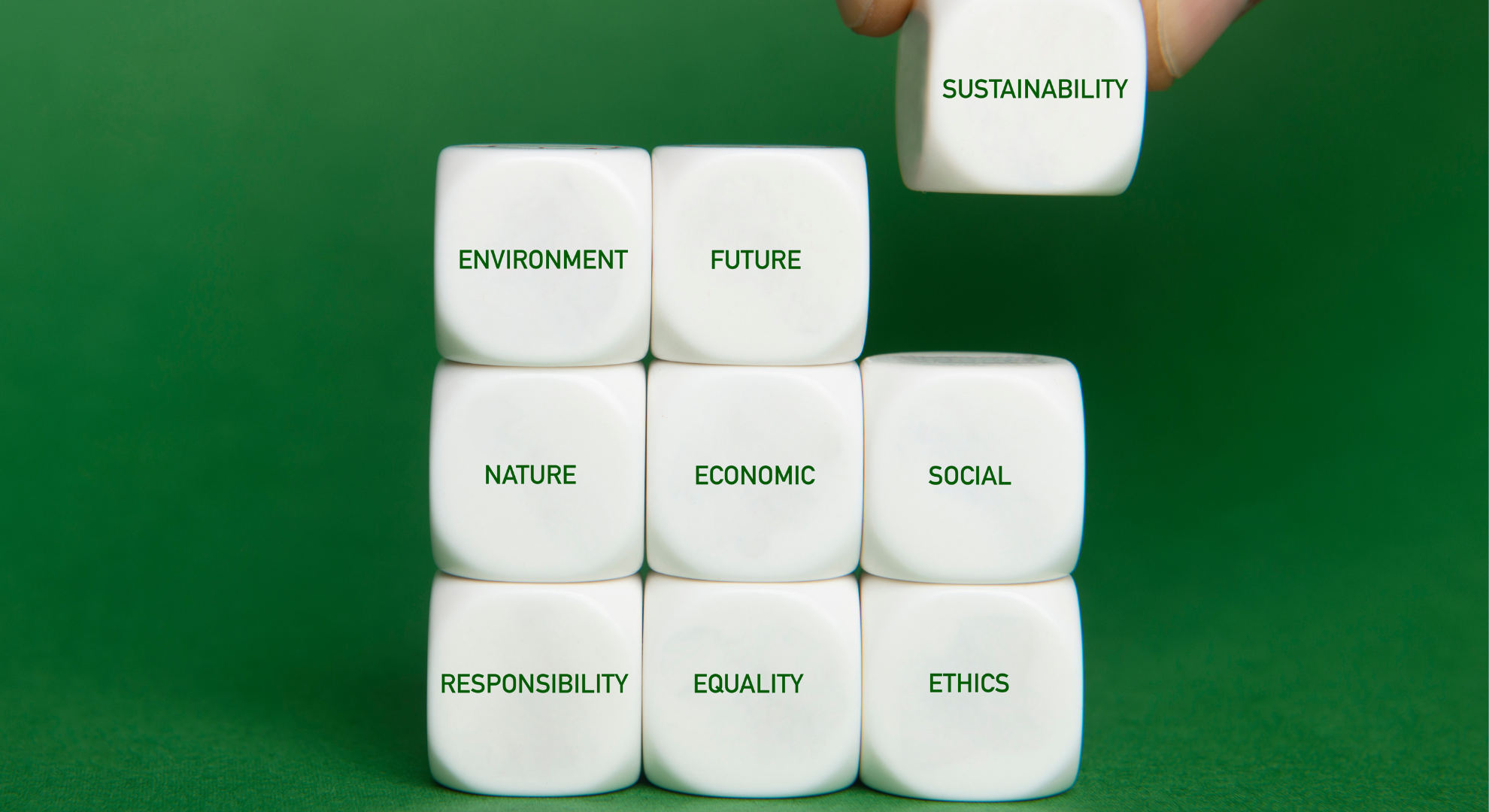One way to differentiate Corporate Social Responsibility (CSR) and Environmental Social Governance (ESG) is to think of CSR as qualitative and driven by considerations and commitments internal to a corporation, and ESG as quantitative and driven by external requirements (ie. international frameworks and standards).
At first glance they can seem synonymous, but they are not the same thing. They each have specific meanings and different aspects of a company to consider when using them.
Differentiating CSR and ESG
What is CSR
CSR stands for Corporate Social Responsibility.
- CSR is centered on the idea that businesses have a responsibility to benefit the society that they exist within—a broader view than the one that says businesses’ only responsibility is to produce economic profit.
- CSR is about accountability and self-regulation; these elements can be incorporated through internal processes such as communication between management and employees.
- CSR commitments serve as benchmarks for preventing and/or mitigating social or environmental harm, adding positive social value, and as indicators of company culture.
- CSR commitments tend to be goal-focused and highly variable, as each corporation will choose commitments that align with their values and overall mission.
What is ESG
- ESG uses environmental, social, and governance metrics to evaluate sustainability efforts, placing a strong emphasis on data-driven reporting.
- ESG policies are led by specific criteria, and utilize standardizing frameworks—often administered by external bodies—that allow for project comparison through ESG scores and ratings.
However, while CSR and ESG have some key differences (see table below), it is important to note that the two concepts are not in conflict: both seek to set goals for and report out on positive societal impact.
CSR vs ESG key differences
| Corporate Social Responsibility (CSR) | Environmental Social Governance (ESG) |
|---|---|
| Broader, more vague scope & reporting | Specific scope & reporting |
| Focus on accountability | Focus on tracking and measuring |
| Generally qualitative | Generally quantitative |
| Projects are relatively individualized | Trend towards a more unified approach (ex. standardized metrics) |
| Stakeholder-based approach | Risk- and/or performance-based approach |
A Brief History of CSR
The origins of CSR
CSR ideology and approaches have shifted dramatically over the past few decades.
The idea of CSR began in the mid-20th century, with the landmark book Social Responsibilities of the Businessman by Howard Bowen widely considered as the beginning of CSR ideology.
In the decades between 1950-70, attitudes towards CSR were shifting as the concept became more widely accepted–aided by the Committee for Economic Development’s introduction of a ‘social contract’ between businesses and society–and practical applications were developed.
The 1980s also saw an increase in CSR operationalization and its role as a decision-making process. However, during this time period, CSR was primarily focused on philanthropy and little else.
CSR ideology in the late 20th to early 21st century became more globalized, as multinational corporations began to face increased reputational risk and increased pressure for social responsibility from both their home and host countries. This environment and need for greater awareness of social impact helped institutionalize CSR and bring the discussion of CSR compliance into the mainstream.
Governmental organizations such as the European Commission (EC) also encouraged the implementation of CSR through actions like passing the European Business Declaration against Social Exclusion and launching the European Business Network for Social Cohesion one year later.
Key concepts such as Carroll’s Pyramid of Corporate Social Responsibility, Burke and Logsdon’s five dimensions of strategic CSR for achieving both business objectives and positive impact, and Elkington’s concept of the Triple Bottom Line were all introduced during this period.
The rise of CSR
CSR grew in influence in the 2000-2010s, when it began being incorporated into policy.
In 2001, the European Commission (EC) introduced a Green Paper called Promoting a European framework for Corporate Social Responsibility that constituted the first step towards the 2002 European Strategy on CSR adopted.
The EC also sponsored a number of CSR conferences and launched a “European Roadmap for Business” discussing CSR objectives for the next few years. This time period also saw the development of standards and frameworks: the idea of the ISO 26000 was first proposed in 2002.
The 2010s introduced the concept of creating shared value (CSV), developed by Heslin & Ochoa and Porter & Kramer.
CSV–which Porter & Kramer explained as practices that simultaneously enhance a company’s competitiveness and advance economic and social conditions in its surrounding communities–has a lot of overlap with CSR and added to the case for increased attention on corporations’ impact.
Moreover, key events such as the Rana Plaza tragedy in 2013 led to more widespread awareness of issues like human rights and ethical manufacturing that fall under the purview of CSR.
Rana Plaza led to the creation of France’s Duty of Care law, which also gained traction in other European countries.
The 2015 United Nations Climate Change Conference (COP21) was another key moment pushing the development of CSR, as COP21 produced a new commitment to the environment and net zero emissions.
More recently (since 2020), sustainability and the idea of regeneration of resources are becoming more prevalent in the field of CSR.
Moreover, one important distinction with modern CSR is the focus on accountability and creating positive impact for the whole value chain; CSR does not stop at simply limiting negative impacts–the goal is to create positive outcomes as well.
In conclusion...
As consumers align their investments with their values and become increasingly vocal in demanding that corporations adhere to a moral standard of social and environmental responsibility, the field of CSR and ESG will likely continue to grow and expand.
No company can prosper nowadays if it is not involved in the community and the people around.
Companies need to take an active role in the community, beyond just making a profit. The positive benefits of this attempt include the company’s expansion and durability of its success.
So, what are you waiting for? Start implementing your ESG strategy today!
And this is where we can help:
If you want to succeed in your sustainable journey…
Save time, get organized, and stay compliant with our tool!
Thanks to our AI, apiday provides you with a simple and efficient process for your data collection, verification, reporting, and certification.
Get your organization started and book a call with our ESG experts!
Frequently Asked Questions
What are the differences between CSR and ESG?
CSR is thought of as a qualitative approach that is driven by internal values and commitments, while ESG is considered quantitative and driven by external requirements (i.e., international frameworks and standards). While the two concepts have some key differences (see table above), it is important to note that both seek to set goals for and report out on social and environmental impacts (mitigating negative ones and enhancing positive ones).
What is the difference between CSR and corporate governance?
The concept of corporate governance is actually a sub-topic of CSR. It refers to the system of rules, practices, and processes by which a company is directed and controlled.
What is the difference between CSR and social responsibility?
Corporate social responsibility is the idea that businesses have a responsibility to benefit the society that they exist within. It is viewed as a form of social responsibility but is used specifically in the corporate business world.
Related articles
Global Reporting Initiative: What It Is and How to Do It
GRI stands for Global Reporting Initiative, and is an international independent standards organization that promotes sustainability reporting through the development of global standards for corporate responsibility, including environmental, social and governance (ESG) reporting...
Impact – What is Impact
The Corporate Sustainability Reporting Directive (CSRD) requires large businesses and SMEs to produce annual reports on their environmental and social impacts.
CSRD – What is CSRD
The Corporate Sustainability Reporting Directive (CSRD) requires large businesses and SMEs to produce annual reports on their environmental and social impacts.
Corporate Sustainability Reporting Directive: All you need to know
The Corporate Sustainability Reporting Directive is an EU regulation that will have a huge impact on how organisations report their environmental, social and governance (ESG) performance...
Sustainability – What is Sustainability
The GRI is an international independent standards organization and currently issues one of the most well-known standards for ESG reporting (GRI Standards).
Discover the latest Sustainability Recent Developments to improve your companies
Sustainability is a concept that evolves due to pressing sustainability challenges, worldwide issues, and its own concept limits. New concepts have emerged to think further and respond better to all the world’s current challenges...
GRI – What is the Global Reporting Initiative
The GRI is an international independent standards organization and currently issues one of the most well-known standards for ESG reporting (GRI Standards).
What is Materiality and Why it matters in business
Materiality is crucial for sustainability reporting because it allows companies to focus on the most important aspects of their sustainability efforts. A company can choose to report on all aspects of its sustainability program, but this would be extremely time-consuming and would probably not be very useful for investors and other stakeholders...
Materiality – What is Materiality
ESG is an acronym for Environmental, Social, and (Corporate) Governance. It refers to the non-financial factors of a corporation’s impact.
EcoVadis – What is EcoVadis rating
Created in 2007, EcoVadis provides a collaborative web-based rating platform for assessing the sustainability performance of organizations worldwide.
Impact-washing – What is Impact-washing
Impact washing can be defined as any marketing claim about a product/good/service/funds triggering a change in the real economy that cannot be supported by evidence.
ISO 26000 – What is ISO 26000
ESG is an acronym for Environmental, Social, and (Corporate) Governance. It refers to the non-financial factors of a corporation’s impact.
B Corp – What is B Corporation certification
ESG is an acronym for Environmental, Social, and (Corporate) Governance. It refers to the non-financial factors of a corporation’s impact.
The concept of impact on social and environmental issues and its implication for companies
Impact measurement is a powerful tool for companies to gauge their impact on social and environmental issues. In this article, we will discuss the concept of impact, its implications for organizations, and how it can be measured...
The most important and recent developments of ESG (Environmental, Social and Governance)
Being a B Corporation is not just about making profits and creating wealth for a company, it is a way of creating a more sustainable future for society! Discover our article about B corps and its benefits here...
The process for an enterprise to get the B corp certification
Becoming a B Corporation is an ambitious undertaking. This article will guide you through the steps required to become a B Corporation…
CSR – What is Corporate Social Responsibility
CSR is centered on the idea that businesses have a responsibility to benefit the society that they exist within—a broader view than the one that says businesses’ only responsibility is to produce economic profit.
What is a B Corporation: what this means and its benefits for companies
Being a B Corporation is not just about making profits and creating wealth for a company, it is a way of creating a more sustainable future for society! Discover our article about B corps and its benefits here...
The guide to EcoVadis certification: frequently asked questions
This guide will take you through the steps of the EcoVadis Certification process, and explain what is involved in becoming a certified business...
The implications of ISO 26000 for companies
ISO 26000 is a standard providing direction for the application of social responsibility to the activities of an organization. But what does this mean? And how can organizations use it to create better and more sustainable business practices? Let's talk about it…
What is the meaning of CSR (Corporate social responsibility) and how to adopt it?
A Corporate Social Responsibility strategy refers to an organization's active consideration of the effects its activities have on the environment, employees, customers, and suppliers. Let's look at how your company could adopt such a program...
ESG – What is Environmental, Social and Governance
ESG is an acronym for Environmental, Social, and (Corporate) Governance. It refers to the non-financial factors of a corporation’s impact.
4 reasons companies should adopt CSR, Corporate social responsibility
CSR is all about managing a company’s externalities while creating sustainable value for stakeholders and continuous innovation for the business. Let's break that down and explore why...
Carbon disclosure project reporting: what is it and how does it work?
Read our article about The Carbon Disclosure Project (CDP), an extra-financial questionnaire that collects data on companies’ environmental practices and performance...
Why is ESG (Environmental, Social and Governance) important for a business
ESG (environmental, social and governance) can help businesses make sound decisions, and investors achieve better long-term returns. Let's discover how...













